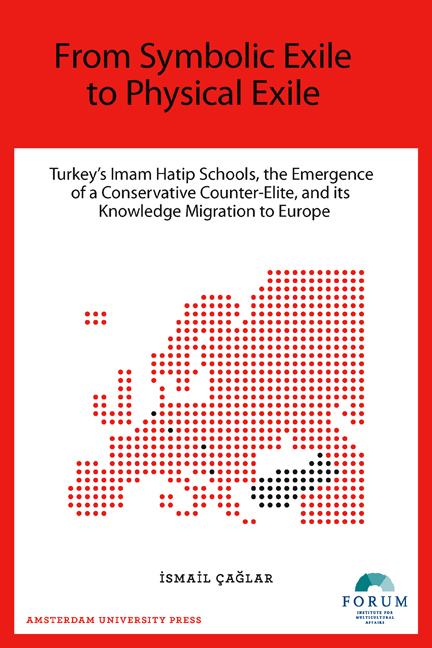 From Symbolic Exile to Physical Exile
From Symbolic Exile to Physical Exile Book contents
- Frontmatter
- Contents
- Foreword: Pious Muslims as a Bridge between Turkey and the West: The Remarkable Case of the Imam Hatip Graduates Studying in Europe
- Introduction
- 1 Historical Background
- 2 İHL Graduates in Vienna
- 3 İHL Graduates in Sarajevo
- 4 İHL Graduates in Other Countries
- Conclusion
- Notes
- Bibliography
- List of Acronyms
- Basic background Information on the Key Respondents
- Index
Foreword: Pious Muslims as a Bridge between Turkey and the West: The Remarkable Case of the Imam Hatip Graduates Studying in Europe
Published online by Cambridge University Press: 16 February 2021
- Frontmatter
- Contents
- Foreword: Pious Muslims as a Bridge between Turkey and the West: The Remarkable Case of the Imam Hatip Graduates Studying in Europe
- Introduction
- 1 Historical Background
- 2 İHL Graduates in Vienna
- 3 İHL Graduates in Sarajevo
- 4 İHL Graduates in Other Countries
- Conclusion
- Notes
- Bibliography
- List of Acronyms
- Basic background Information on the Key Respondents
- Index
Summary
PARADOXES OF TURKEY'S SECULARISM
Turkey's particular form of secularism has given rise to a number of surprising paradoxes, one of which constitutes the subject of this study. Pious Muslims, who were prevented from entering Turkish universities by a secular elite fearful of losing its control of state and society, have been sending their best and brightest to European (and American) universities, thus contributing to the emergence of a well-educated counter-elite with an international outlook.
Turkey's secularism or laiklik – after the French laïcité, which constituted its source of inspiration – is not based on the idea of a separation of the political and religious spheres, but rather on the rejection of all religious authority independent of the state. The founders of the Republic intended to liberate the population from the influence of Sufi sheikhs and traditional ulama, banning Sufi orders and replacing the medreses (traditional Islamic schools) with universal education in modern, Western-type schools. However, their successors recognized that society needed some form of religious education and religious knowledge, and rather than relegating those to the private sphere, the state has consistently made sure it kept a close control of religious education and knowledge.
While, on the one hand, the main institutions of the old religious establishment were abolished – the office of the sheikh al-islam, the religious courts, and medreses of all levels were closed in 1924, followed by the Sufi orders and saints’ shrines in 1925 – on the other hand, the secular Republic soon established its own institutions in order to take care of the religious needs of its subjects. Since the political liberalization that began in the 1950s, the involvement of the state in matters of religion has gradually become more pervasive. Through the Directorate of Religious Affairs (Diyanet İşleri Başkanlığı, DİB), the Republic controls all major mosques in the country and is the formal employer of prayer leaders (imam), preachers (hatip, vaiz) and other mosque personnel. The majority of saints’ shrines have even been reopened and placed under the supervision of DİB, which is also tasked with keeping the expressions of ‘popular’ Islam in check.
In September 1980, the armed forces, the chief guardians of Turkey's secular order, carried out yet another coup d’état.
- Type
- Chapter
- Information
- From Symbolic Exile to Physical ExileTurkey's Imam Hatip Schools, the Emergence of a Conservative Counter-Elite, and Its Knowledge Migration to Europe, pp. 7 - 22Publisher: Amsterdam University PressPrint publication year: 2013


